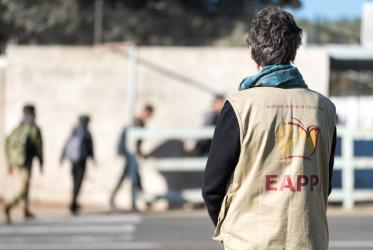East Jerusalem is internationally recognized as occupied territory, and Israel has an obligation under international law to ensure the wellbeing of the occupied population. Yet the threat of forced evictions and displacement continues to loom over Palestinian families in East Jerusalem neighbourhoods such as Sheikh Jarrah and Silwan.
Mohammad Sabbagh, from Sheikh Jarrah, explained the difficult position in which the Israeli courts have put his family: if they agree to a finite timeframe for which they can stay, they’ll eventually lose their land. “This is the situation: if we say yes, we lose our peaceful struggle in the court,” he said, adding that he has been grateful for many years for the presence of the World Council of Churches (WCC) Ecumenical Accompaniment Programme in Palestine and Israel. “We are relying on their activities to explain what’s going on here,” he said.
Su’ad Abu Ramouz, a resident from the neighbourhood of Silwan, said her home has been in danger of demolition since as far back as 2004.
“People have lived here for about 70 years,” she said. “All of these documents were presented at court and we all went to court—obviously the Israeli court—and they just gave us a decision that we need to leave so they can demolish our houses.”
In fact, the entire district is subject to demolition, Ramouz said, adding that the courts have sent a ruthless message: “We will demolish your home so you leave—or just demolish it yourselves and leave.”
Some of these orders have been suspended, she said, but peaceful protestors still face mistreatment by police.
“They do not respect any human dignity or human rights,” she said. “We try to do our best to show how peaceful we are.”
Ramouz said that settlers try to harass residents of Silwan in the streets. “They don't care that we have kids, that we have old people, that we have women,” she said. “We will never give up our rights. We will fight in a peaceful way, we will protest in a peaceful way, and we will fight in a legal way.”
Talking from a legal perspective, Ir Amim director of international relations and advocacy Amy Cowen observed that what in Israeli discourse currently gets reduced to a dispute over land between groups of private individuals, is in fact a consequence of a bigger picture of discriminatory legislation on behalf of the state of Israel against the Palestinian population.
WCC deputy general secretary Prof. Dr Isabel Apawo Phiri reflected that discrimination against Palestinians is only deepening the division and distancing the world from peace.
“It is very sad to note that, as of today, after so many years, we see that both Palestinian and Israeli leaders have not been successful in achieving peace through political settlement or through armed conflicts and confrontations,” she said. “Displacing people from their homes in their own homeland will only bring more animosity, not peace and coexistence.”
Jamil Khader, from the Episcopal Church in Jerusalem, urged all people to cultivate peace. “All who are living with injustice, God is with you,” said Khader, who serves as ecumenical officer to the WCC Jerusalem Liaison Office. “We have to live together. We have to cultivate peace. When you cultivate peace, you will cultivate peace in your actions and your lives.”
The webinar followed the annual World Week for Peace in Palestine and Israel, and is part of a range of efforts made by the World Council of Churches and its Ecumenical Accompaniment Programme in Palestine and Israel to advocate for just peace in the region.
It also follows a recent East Jerusalem Initiative through which the WCC has accompanied Palestinian families facing eviction and displacement through global advocacy efforts.








